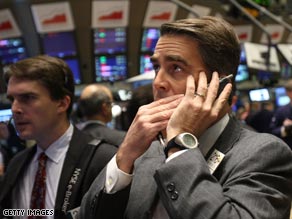
Wall Street traders watch the boards as the markets open Friday.
In New York, the Dow Jones pared early losses of 150 points before slipping back again. By early afternoon trading in the benchmark index had lost 0.58 percent of its value, falling to 8,515.
Meanwhile the dollar continued to fall, hitting a 13-year low of 88.16 yen against the Japanese yen.
In the UK, the pound slipped further against the euro, hitting an all-time low of €1.118 as analysts predicted the currencies could be heading for parity. The pound has shed about 20 percent of its value against the euro in the past year. ![]() Watch report on possible pound-euro parity »
Watch report on possible pound-euro parity »
In Brussels, European Union leaders approved a €200 billion ($267 billion) stimulus plan to help the bloc's battered economy by providing support for vulnerable sectors such as construction and motors.
European stocks in France and Germany rallied a little after dipping more than 4 percent in morning trading. Paris' CAC closed down 2.5 percent and Frankfurt's DAX was down 1.8 percent.
In London, the FTSE 100 was down almost 100 points, or 2.2 percent. Banking stocks were hit hard as shareholders at HBOS voted in favor of a proposed takeover by Lloyds TSB -- a merger that will create a retail bank accounting for a quarter of British mortgages and half of savings.
Earlier, Japan's Nikkei 225 finished the day down 5.6 percent at 8,236, and Hong Kong's Hang Seng index slid 5.5 percent to 14,758. South Korea's Seoul Composite lost nearly 4.4 percent. Indexes in Sydney, Shanghai, Jakarta, and and Singapore all closed the day sharply lower.
Experts fear the failure of the U.S. automaker bailout plan and the possible collapse of any of the "Big Three" -- General Motors, Ford and Chrysler -- could have devastating consequences for the economy far beyond the boardrooms and production lines of Detroit. ![]() Watch how the bailout failure will play out with investors »
Watch how the bailout failure will play out with investors »
The collapse of negotiations could possibly doom General Motors to bankruptcy and closure in the coming weeks, with Chrysler potentially following close behind.
Don't Miss
While Ford Motor has more cash on hand to avoid an immediate crisis, its production could be disrupted by problems in the supplier base, as could the production of overseas automakers with U.S. plants such as Toyota and Honda.
Hopes for congressional approval of a bailout fell apart on Thursday night as Democrats and Republicans were unable to reach a deal.
The rescue plan would have provided $14 billion in federal loans as a stopgap measure until the new Congress and the incoming administration of President-Elect Barack Obama could reach a longer-term solution.
On Friday U.S. President George W. Bush's press secretary said it would be "irresponsible" to allow the U.S. auto industry to collapse and said the White House was seeking alternative ways of using bailout money to help automakers.
"Given the current weakened state of the U.S. economy, we will consider other options if necessary... to prevent a collapse of troubled automakers," Dana Perino said in a statement.
"A precipitous collapse of this industry would have a severe impact on our economy, and it would be irresponsible to further weaken and destabilize our economy at this time."
Stocks are also struggling after surging in a short period of time. Between November 20, when stocks hit the current bear market low and Monday, the S&P 500 surged 21 percent. Since then, the stock market has been seesawing.

"We had a large rally in a pretty short period of time and so the market is taking a breather here," said Christopher Colarik, portfolio manager at Glenmede. "We're in a bottoming process, but its still going to take a while."
In the week ended December 10, investors pulled roughly $2.8 billion out of equity mutual funds, after pulling $12.1 billion out of funds in the previous week. Investors have cashed out of equity mutual funds in 17 of the last 19 weeks.








No comments:
Post a Comment